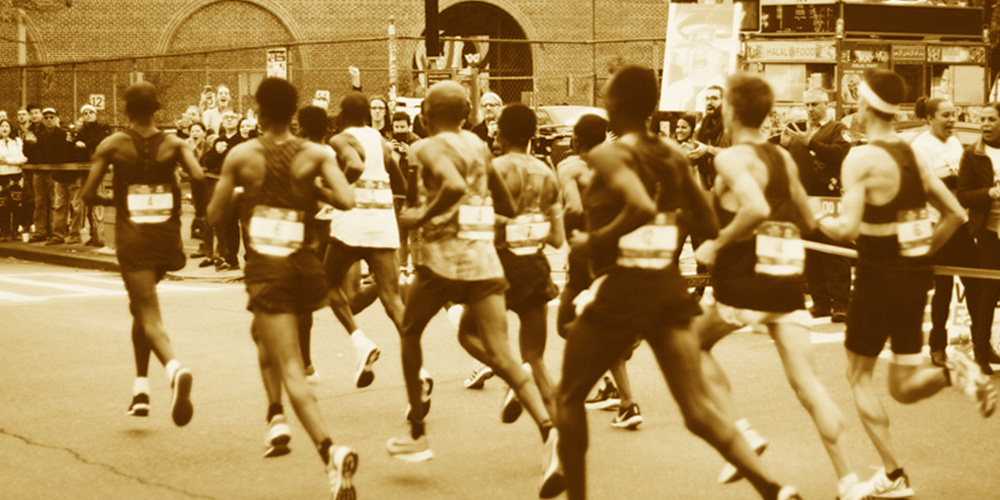The last weeks and months have been intense. The preparation for the competition took a lot of energy and time. Now the strains of the preparation are over as well as the sweat of your main competition has dried up. Your focus for the next days and weeks should now be on recovery, which is just as important as the training itself. This blog post will guide you through an optimal recovery process and give you tips on how to motivate yourself anew.
Running competitions are a heavy burden on the body. Especially when it comes to longer distances such as an ultra-run, a marathon or a half-marathon. During the competition, you take up a debt on your own body, which you should pay back in the following days and weeks through various recovery measures. Otherwise, you run the risk of making a good return to training impossible.
What to do now?
Immediate actions on competition day:

- Put on dry clothes as soon as possible to prevent your body from cooling down too quickly.
- Try to restore your body’s fluid and energy balance as quickly as possible. Avoid alcohol, however, at least for the first few hours.
- Don’t expose yourself to the sun unnecessarily.
- Ideally, you should do a short cooldown to “cool down” your body slowly: a loose jogging or an alternative form of training such as cycling. Especially after a long competition, this might not always be your favourite activity. Still, concentrate at least on the points above.
- An alternating hot/cold shower can also boost your blood circulation and promote recovery.
- At many competitions, there is the possibility for a massage in the finish area. A feel-good massage, possibly with lymph drainage, stimulates recovery as well.
- Later in the day, a little stretching can be beneficial.
- Avoid intensive wellness and sauna directly after the competition.
Medium-term actions – The days after the competition:

- Do not do any training in the first day after your main competition. Instead, work with regenerative measures.
- A longer massage with a masseur or physiotherapist can be a good way to boost your recovery and relaxation.
- Further, water in all its forms is a blessing and especially promotes recovery:
- Sauna visits are beneficial indeed. They stimulate blood circulation and generally help to promote recovery.
- A spa visit with a bubble bath pool or salt water is always fun.
- Swimming or bathing in a lake (or even better in the sea) is a great way to boost relaxation.
- Often, the most painful time is on the second day after the competition due to sore muscles. Rest assured, this is quite normal.
- In addition to the points mentioned above, mental recovery is also important. Just do what you feel like doing without having to think about your next workout too much: How about dinner with friends soon?
Long-term actions:
- Even now, a few days into the recovery process, it’s good to keep your blood circulation going (of course at a moderate level). If you feel fit again after a few days of recovery, you can initiate more active regeneration measures. This includes extensive movement in the water, loose spinning, walks, hikes (mainly uphill), etc.
- However, see that you do not plan these trainings in advance. Instead, decide spontaneously whether you feel like it and have the energy to do it. It is extremely important to listen to your body during this phase. Note that planned trainings are more difficult to adjust than spontaneous decisions made on your desire and energy to move in a particular moment.
- How about trying out something new? Yoga – for example – promotes flexibility and helps to eliminate imbalances, thus preventing injuries.
- During the recovery phases, running.COACH will not plan any trainings for you for a certain period of time, exactly for the reason mentioned above. In principle, it is not forbidden to move. However, you should definitely listen to your body and take a break in case of tiredness or slight pain rather than taking any unnecessary risks.
My competition didn’t go the way I imagined it would. What can I change in the future?
- We recommend bringing variation into your training routine by altering the number of workouts. This can be permanent or by consciously planning one week with one unit more and another week with one unit less. Example: 5 instead of 4 and then 3 instead of 4 units. You can drag and drop the units to other weeks in the calendar view, for example, or add units manually.
- Make sure you can meet the guidelines of running.COACH. It is particularly important that you are able to perform the long jogs and the intensive runs (intervals, threshold runs) as often as possible every week. In case of a diary clash, it makes sense to postpone these key sessions to another day and to skip an endurance run or regeneration run instead.
- Make sure to get enough rest during the training phase as well.
- Consciously incorporate regenerative activities.
- Set yourself new goals – These would ideally include goals you can tackle together with your friends!


One reply on “The training weeks right after the marathon / main race”
[…] The detailed answer to this question can be found here. […]